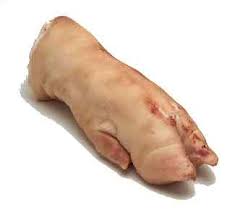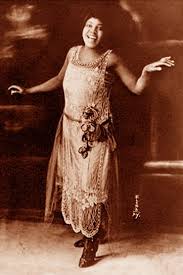What Do You Mean, You Don't Sell Pigs Feet?
by Con Chapman
Lately, the grocery store down the road has undergone an upgrade, if I have my directions on that right. New textured faux-stone floor, the addition of a wine department, a harpist—I kid you not—in the baked goods department on weekends. Let me tell you, nothing goes better with a Saturday morning donut than the sonorous plinkings and plunkings of a classical musician sitting between you and the express checkout.

“Ketchup? Aisle 3. Now buzz off.”
The store is situated at the ragged edge of a town that's gone upscale. Across the street is a used car lot, around the corner a gas station. Thank God there's a Starbucks across Route 27! Without a second pillar of civilization to provide some solidity, we might regress into barbarism.
I can't blame the local merchants for trying to squeeze an extra buck a sixpack out of exurban professionals like myself, but let's not forget our roots. For centuries, thrifty New Englanders lived by the mantra “Use it up, wear it out, make it do, do without.” We're hardy folk, even if some people up here drive Range Rovers with heated steering wheels.

“We don't carry ‘em.”
So it was with more than a little exasperaton that I scoured the meat department today, looking in vain for an essential ingredient of a recipe I planned to make. Finally giving up, I threw myself upon the tender mercies of the butcher on duty, and asked what I thought was a commonplace question, one the fellow probably heard a half dozen times before noon each day: “Excuse me—where are the pig's feet?”

Pig's foot
The guy looked at me as if I were daft (whether I am is beside the point). He then uttered the reply that still strikes me as incomprehensible. “We don't carry pig's feet.”

Monty Python cheese shop sketch
I felt a bit like John Cleese in the Monty Python cheese shop sketch; a cheese shop without cheese, a fully-stocked meat department—without pig's feet? Surely you jest!
If I were the sort of person who takes umbrage at every commercial slight as a result of watching too many TV Consumer Action Reporters, I would have raised my voice, then and there, and proclaimed loudly, so that all about could hear, “What do you mean, you don't carry pig's feet!” But I didn't. I bought a ham steak and slank (slunked?) off, and substituted it in the mussels dish I made.

Mussels, without pig's feet.
Pig's feet have a long and honorable history in American cuisine—and music. Bessie Smith (and later Billie Holiday) sang “Gimme a Pigfoot and a Bottle of Beer.” You can be sure that Dinah Shore never did. When someone says they've been living “high off the hog,” they mean they've progressed economically beyond the cheap cuts of meat to be found lower down on the animal, and nothing gets lower than the feet.

Bessie Smith: Give the woman a pig's foot, would you?
Pig's feet are tough but savory, and were a common item in grocery stores in at least three parts of the country I've lived in; central Missouri, the South Side of Chicago, and the Main South area of Worcester, Mass., a polyglot working class neighborhood. I understand that the sight of a pig's foot on the conveyor belt at the checkout line can be a trifle jarring, especially when contrasted with food “products” such as fruit roll-ups, but the essential pigginess—and footiness—of the item serve to remind one of the humble origins of the stuff we put in our mouths.

Kant: “I am categorically in favor of pig's feet.”
As with mussels, a pig's foot is unprocessed, and visibly identifiable as a former living being, or at least a part thereof. It is what Immanuel Kant would call the thing in itself, as opposed to denatured and deracinated by-products of the barnyard such as chicken tenders. And it's worth it, when you're at the cash register, to throw a thing-in-itself down on the conveyor belt behind a bleached blonde with a cartful of “natural” foods. Let's face it—there's nothing more natural than a pig's foot.
So all hail the humble pig's foot. And could you please turn down that harp?
|
1
fav |
1673 views
2 comments |
777 words
All rights reserved. |
Author's Note
The author has not attached a note to this story.
Other stories by Con Chapman
Tags
This story has no tags.
Cynical and delightful. . .fave
Throwing yourself on a butcher is not recommended for the faint of heart. These are the lengths I will go to for Fictionaut readers.